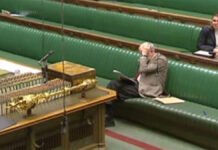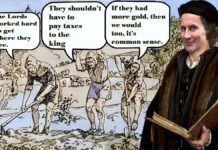Officials believe London has moved ‘significantly’ on the level playing field issue but several EU countries are getting nervous.
Press play to listen to this article
Voiced by Amazon Polly
EU countries are getting so nervous about concessions in the final phase of the Brexit negotiations they’ve reminded the EU’s chief negotiator Michel Barnier not to cross the bloc’s red lines just to clinch a deal with the U.K.
That message was conveyed to Barnier, both by EU ambassadors on Wednesday and by EU sherpas on Thursday, according to several officials present at those meetings. Last Friday, fisheries ministers also reminded Barnier of his negotiating mandate and to maintain the current access to U.K. waters.
“We are millimetres from the bottom line of the mandate. For some issues, we’re even on the red line, and we don’t want to cross it,” said one EU diplomat.
Although the diplomat stressed confidence in Barnier, they added that a veto from EU countries could not be ruled out if he crosses any red lines. “If the mandate is not adhered to, they have every right to do so,” the diplomat said.
France is the most vocal in its worries about the final concessions, although others such as Belgium, the Netherlands and Denmark are equally worried.
“We’re not pushing for a no deal … but we’re pushing for reaching an ambitious agreement,” a French government official said. “We push the negotiator to use the last days or even the last hours that we have left [to negotiate an agreement].”
EU countries also asked Barnier to start sharing parts of the texts informally to reassure EU capitals about the concessions being made.
One EU official said it made sense that EU capitals were becoming increasingly nervous, given how high the stakes are and how much the Commission is holding its cards to its chest during the endgame.
“This is not some small, faraway country. It’s is one of the most important free-trade deals the EU will close for a long time to come,” the official said. “If we give in too much on level playing field now, it will hurt us for decades to come. So it’s a good thing that the Commission is aware just how much depends on its judgment call [on] which compromise is good enough.”
Are we nearly there yet?
While both sides have made compromises, “significant divergences” remain.
According to three EU officials, London has moved “significantly” on the issue of level playing field to guarantee British business can’t undercut the bloc, which is a must for the EU to green light any future deal. British negotiators, however, would not confirm this.
However, a U.K. official said the talks had taken a turn for the worse.
“We were in a relatively good place yesterday but it’s been a destabilizing 24 hours,” the official said. “There have been curveballs thrown in. This doesn’t mean we’re definitely not going to get there, but we are not seeing progress happen as rapidly as we’d hoped. There won’t be white smoke tomorrow but we have to treat each day as it comes.”
The EU wants to agree with the U.K. on non-regression clauses so as to not to water down shared rules they currently have. “There is now a minimal number of guarantees of what we can define as regression,” an EU diplomat said. “Both sides have had to make compromises on this. But there’s still a lot of discussion on potential retaliation in case the U.K. decides to abandon these principles. As London already made serious concessions, it now remains to be seen how much further they can go.”
Another EU official said that while there’s much more agreement on level playing field than on fish, “we’re not there yet” and “the devil is in the details.”https://d73dea088b493f20c85dc58a109f880e.safeframe.googlesyndication.com/safeframe/1-0-37/html/container.html
On state aid, it’s still not clear whether the EU will accept that the U.K. will not have an “ex-ante” state aid regulator that intervenes in subsidies before they are agreed upon.
An “ex-post” system would mean that such subsidies can only be disputed after they have been handed out, which threatens to hurt EU businesses while they wait for a verdict. “It’s quite clear that the whole complex of ex-ante regulation, ex-post regulation, principles and domestic enforcement, especially in the U.K., are not configured in a way we can agree to,” the first EU diplomat said.
Given those divergences, officials on both sides remain reluctant to say when an agreement will be feasible. There is also no indication yet about a call between U.K. Prime Minister Boris Johnson and Commission President Ursula von der Leyen, even though such a call would “normally be the final chapter of this story,” said one of the EU officials.
Elisa Braun and Emilio Casalicchio contributed reporting.
Discover POLITICO Pro
In-depth reporting, data and actionable intelligence for policy professionals – all in one place. FIND OUT MORE
Support Independent Journalism Today
Our unwavering dedication is to provide you with unbiased news, diverse perspectives, and insightful opinions. We're on a mission to ensure that those in positions of power are held accountable for their actions, but we can't do it alone. Labour Heartlands is primarily funded by me, Paul Knaggs, and by the generous contributions of readers like you. Your donations keep us going and help us uphold the principles of independent journalism. Join us in our quest for truth, transparency, and accountability – donate today and be a part of our mission!
Like everyone else, we're facing challenges, and we need your help to stay online and continue providing crucial journalism. Every contribution, no matter how small, goes a long way in helping us thrive. By becoming one of our donors, you become a vital part of our mission to uncover the truth and uphold the values of democracy.
While we maintain our independence from political affiliations, we stand united against corruption, injustice, and the erosion of free speech, truth, and democracy. We believe in the power of accurate information in a democracy, and we consider facts non-negotiable.
Your support, no matter the amount, can make a significant impact. Together, we can make a difference and continue our journey toward a more informed and just society.
Thank you for supporting Labour Heartlands












